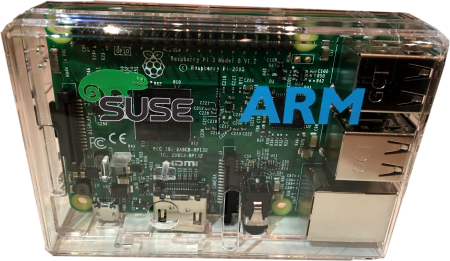Suse Enterprise Linux for the Raspberry Pi
-
https://www.raspberrypi.org/blog/suse-linux-enterprise-server-for-raspberry-pi/
Suse Linux is now available for the Raspberry Pi. Very important as this provides our first really enterprise solution for the RP platform. This lets the little ARM device compete in a whole new way.
Thanks to @NerdyDad for pointing this one out to me this morning.

-
Nice. What's a good use case for an enterprise OS on that device? Cool concept. Just curious what others might do with it.
I've noticed most businesses using them as sensors. But with SLE, there must be a new direction...
-
@BBigford said in Suse Enterprise Linux for the Raspberry Pi:
Nice. What's a good use case for an enterprise OS on that device? Cool concept. Just curious what others might do with it.
I've noticed most businesses using them as sensors. But with SLE, there must be a new direction...
We use them for displays. We run Chromium in kiosk mode with our APEX apps to display information.
-
@BBigford said in Suse Enterprise Linux for the Raspberry Pi:
Nice. What's a good use case for an enterprise OS on that device?
Few things. Standardization with traditional AMD64 machines is one reason. Whether that means standard interfaces for end users or standard management for IT... either way.
Ability to treat the Raspberry Pi like a server (you could do this with Ubuntu before, but Suse is even more "server".) While the RP is a low end, fragile device it is decently stable and could easily be used in a variety of enterprise use cases. An example of which might be a web server farm. If doing so, you'd want an enterprise server OS.
It's not that Suse fills a huge gap here, but it provides variety in a space where only Ubuntu had yet ventured in any real way. And while Ubuntu is popular, Suse carrier a lot of weight. They are the most mature in the enterprise Linux space.
-
I'm seeing it as a good entry level device to finally learn Linux Server administration at an affordable device. Granted the hardware isn't something that you're normally going to normally see in an enterprise environment, it would give me nearly identical experience managing a linux server in an enterprise environment.
-
@NerdyDad said in Suse Enterprise Linux for the Raspberry Pi:
I'm seeing it as a good entry level device to finally learn Linux Server administration at an affordable device. Granted the hardware isn't something that you're normally going to normally see in an enterprise environment, it would give me nearly identical experience managing a linux server in an enterprise environment.
But not as identical as running a VM on your laptop. I think Raspberry Pi for learning is very bad. It's the worst option for Linux education.
-
In the enterprise today your Linux is 99.99% going to be on AMD64 and will be a VM. With an RP your focus is on learning the quirks of RP and your Linux install is as different from enterprise use as you can make it. But a VM on a laptop would be essentially identical.
-
@NerdyDad said in Suse Enterprise Linux for the Raspberry Pi:
I'm seeing it as a good entry level device to finally learn Linux Server administration at an affordable device. Granted the hardware isn't something that you're normally going to normally see in an enterprise environment, it would give me nearly identical experience managing a linux server in an enterprise environment.
The hardware doesn't matter at all. Like SAM suggested, go for a VM. There's no difference.
There are actually pitfalls in using a Pi, for example there isn't any RTC (realtime clock and battery). This can give you very weird results during reboots because next to no application expects a filetime to go backwards, which can happen without a working clock (depends on timing, network availability during reboot, working fake-hwclock package etc).